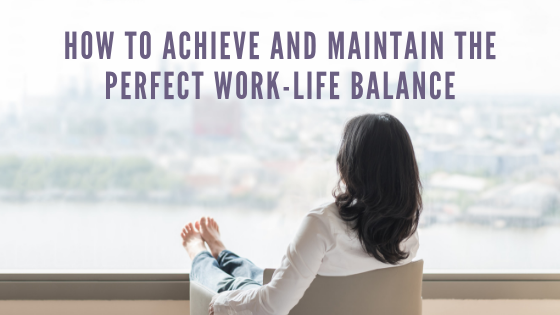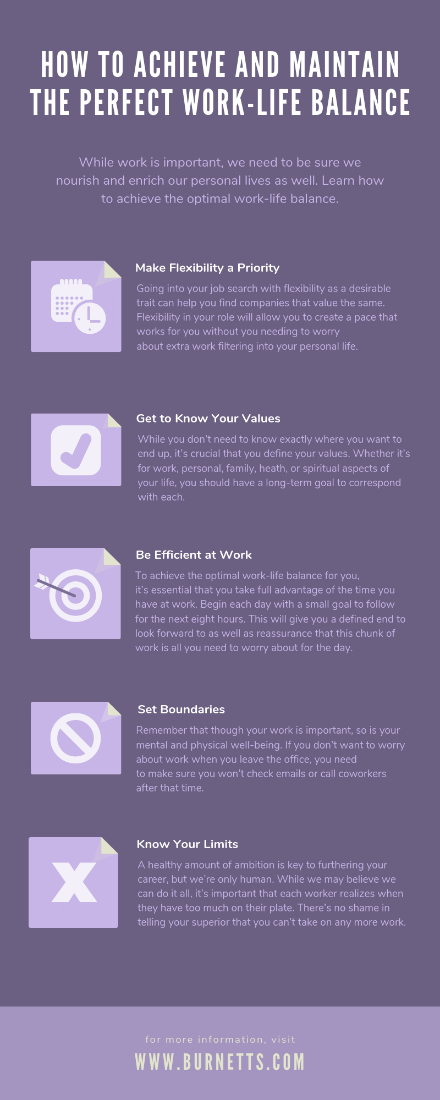It’s easy to get engrossed in our work life. From attending daily meetings to putting together presentations, our days are so packed that it leaves little time to think about anything else. No matter how career-driven you are, though, it’s still important to set aside time for yourself once you leave the office. The first step to finding the career you want is knowing how to achieve the optimal work-life balance for your lifestyle.
Make Flexibility a Priority
To increase your opportunities for balancing your work and home-life, you need to begin the process before you even land a job. Going into your job search with flexibility as a desirable trait can help you find companies that value the same. Flexibility in your role will allow you to create a pace that works for you without you needing to worry about extra work filtering into your personal life. Additionally, a company that values flexibility will allow you to deal with unexpected life situations in an understanding setting.
Get to Know Your Values
To make the most out of that flexibility, you will need to set some goals and know what you want out of life. While you don’t need to know exactly where you want to end up, it’s crucial that you define your values. Whether it’s for work, personal, family, health, or spiritual aspects of your life, you should have a long-term goal to correspond with each. Doing so will ensure you’ll always think about these values and you’re less likely to let one area suffer.
When you understand your values for life outside of work, you can also determine what kind of worker you are. For instance, Job-oriented workers are those who use their job as a way to fund their hobbies. Career-oriented individuals, on the other hand, view their jobs as a way to climb the company ladder and gain achievements. Others, however, see their job as a part of who they are and use their work to feel fulfilled in life. Deciding where you fall between these categories can be beneficial in tracking your priorities and setting additional goals accordingly. Whether this process includes a career change or a change in focus is entirely dependent on what you find rewarding.
Be Efficient at Work
To achieve the optimal work-life balance for you, it’s essential that you take full advantage of the time you have at work. Begin each day with a small goal to follow for the next eight hours. This daily goal will give you a defined end to look forward to as well as reassurance that this chunk of work is all you need to worry about for the day—barring unforeseen circumstances, of course. To help reduce the amount of stress in your workday, focus on small pieces of work one at a time.
The key to setting these goals is to make yourself stick to them. While additional tasks will find their way to your desk, staying on track will allow you to get as much done as possible. Even if you can’t finish everything you planned to complete in one day, there’s no need to worry. You can reschedule it for first thing in the morning, so long as you make a note to prioritize it over other tasks.
To stay efficient throughout the day, it’s important to develop a method to organize your work as well. A system where you can easily find what you’re looking for can significantly cut down on the time it takes to finish certain projects. You can also apply this system to your personal life as well to make non-work related projects a bit easier to manage.
Set Boundaries
Though modern technology makes it easier to check your email or finish a presentation from anywhere at any time, it’s crucial that you set times where work isn’t allowed. Remember that though your work is important, so is your mental and physical well-being. If you don’t want to worry about work when you leave the office, you need to make sure you won’t check emails or call coworkers after that time. Though it might be a difficult adjustment at first, establishing a cut-off time for work will reward you with some much-needed time to participate in other activities.
As you set these boundaries, keep in mind that you may need to adjust your schedule a few times to find the perfect balance. Many employees find themselves needing to check their emails as soon as they get home or even finish a presentation that’s due the next day. It’s okay to be in these situations as long as you adjust your personal schedule to accommodate it.
You should also let your employers know that you want to work toward this balance. Though it might seem like it’s not their business, your employers should always be informed on when, and how, they can reach you when needed. Inform them of when you stop answering emails to help them plan for situations in your absence.
Know Your Limits
A healthy amount of ambition is key to furthering your career, but we’re only human. While we may believe we can do it all, it’s important that each worker realizes when they have too much on their plate. There’s no shame in telling your superior that you can’t take on any more work. Many employers see this admission as a sign that you’re responsible. As individuals get overwhelmed, their quality of work begins to decline. Also, this can result in problems that could’ve been avoided by being honest about your capabilities and time. This honesty and knowledge of your skills can go a long way in helping you grow within your field.
If you want flexibility in the workplace, Burnett’s Staffing’s Dallas employment agency can put you in touch with the working environment you need to succeed. Our recruiters can evaluate your career goals to help you search for job opportunities with employers that align your work-life balance wants and needs.



